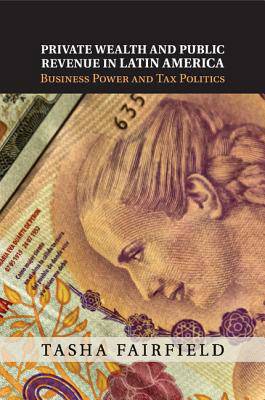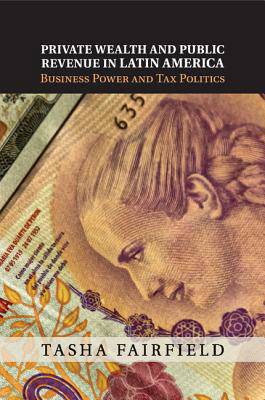
Door een staking bij bpost kan je online bestelling op dit moment iets langer onderweg zijn dan voorzien. Dringend iets nodig? Onze winkels ontvangen jou met open armen!
- Afhalen na 1 uur in een winkel met voorraad
- Gratis thuislevering in België vanaf € 30
- Ruim aanbod met 7 miljoen producten
Door een staking bij bpost kan je online bestelling op dit moment iets langer onderweg zijn dan voorzien. Dringend iets nodig? Onze winkels ontvangen jou met open armen!
- Afhalen na 1 uur in een winkel met voorraad
- Gratis thuislevering in België vanaf € 30
- Ruim aanbod met 7 miljoen producten
Zoeken
Private Wealth and Public Revenue in Latin America
Business Power and Tax Politics
Tasha Fairfield
Paperback | Engels
€ 67,95
+ 135 punten
Uitvoering
Omschrijving
Inequality and taxation are fundamental problems of modern times. How and when can democracies tax economic elites? This book develops a theoretical framework that refines and integrates the classic concepts of business's instrumental (political) power and structural (investment) power to explain the scope and fate of tax initiatives targeting economic elites in Latin America after economic liberalization. In Chile, business's multiple sources of instrumental power, including cohesion and ties to right parties, kept substantial tax increases off the agenda. In Argentina, weaker business power facilitated significant reform, although specific sectors, including finance and agriculture, occasionally had instrumental and/or structural power to defend their interests. In Bolivia, popular mobilization counterbalanced the power of economic elites, who were much stronger than in Argentina but weaker than in Chile. The book's in-depth, medium-N case analysis and close attention to policymaking processes contribute insights on business power and prospects for redistribution in unequal democracies.
Specificaties
Betrokkenen
- Auteur(s):
- Uitgeverij:
Inhoud
- Aantal bladzijden:
- 364
- Taal:
- Engels
Eigenschappen
- Productcode (EAN):
- 9781107459090
- Verschijningsdatum:
- 2/02/2017
- Uitvoering:
- Paperback
- Formaat:
- Trade paperback (VS)
- Afmetingen:
- 152 mm x 229 mm
- Gewicht:
- 530 g

Alleen bij Standaard Boekhandel
+ 135 punten op je klantenkaart van Standaard Boekhandel
Beoordelingen
We publiceren alleen reviews die voldoen aan de voorwaarden voor reviews. Bekijk onze voorwaarden voor reviews.











